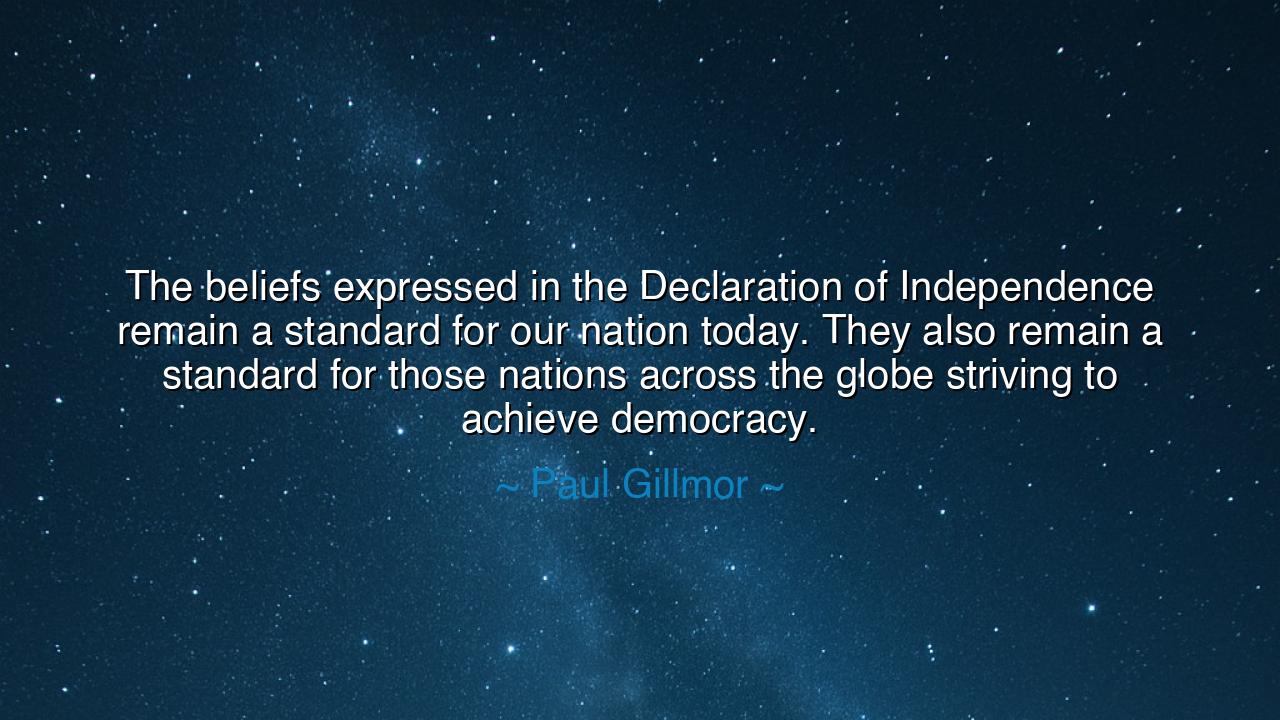
The beliefs expressed in the Declaration of Independence remain a
The beliefs expressed in the Declaration of Independence remain a standard for our nation today. They also remain a standard for those nations across the globe striving to achieve democracy.






There are words written not merely for a moment, but for all of time. When Paul Gillmor said, “The beliefs expressed in the Declaration of Independence remain a standard for our nation today. They also remain a standard for those nations across the globe striving to achieve democracy,” he was speaking of such words — words that breathe with eternal fire. His reflection reminds us that the Declaration of Independence was not only a document of rebellion, but a covenant of principles, a testament to what humanity may be when it dares to proclaim that liberty and equality are not gifts from rulers, but the birthright of every soul.
The origin of this truth lies in the summer of 1776, when a group of men, weary of tyranny and rich in conviction, gathered in Philadelphia to declare that a people may govern themselves. When Thomas Jefferson penned the Declaration, he was not inventing freedom; he was uncovering it — giving language to a truth long buried beneath the weight of kings. “All men are created equal,” he wrote, “and endowed by their Creator with certain unalienable rights.” These words, as Gillmor suggests, became more than the foundation of a nation; they became a standard, a shining measure by which all just governments would one day be judged.
To call the Declaration a “standard” is to say it stands as a moral compass, not just for America, but for all who seek to walk upright in the eyes of history. The truths it proclaims — that power must answer to the people, that government exists to secure rights, not to grant them — are universal. They transcend borders, languages, and centuries. In every corner of the world where men and women rise against oppression, the echo of 1776 resounds. It is the whisper in the hearts of those who march in the streets, the courage in the voice of those who defy dictators, the hope in the eyes of those who dream of democracy.
We have seen this echo in the struggles of nations far from America’s shores. In 1989, when the people of Eastern Europe rose up against communist rule, they did not fight for conquest, but for dignity. In Poland, in East Germany, in Czechoslovakia, the cry was the same: freedom, self-determination, and human rights. The beliefs of the Declaration lived again — not as relics of American history, but as universal aspirations. Even the Chinese students who stood in Tiananmen Square carried banners that spoke of liberty and the right to self-government. The torch that was lit in Philadelphia burned in their hands, too.
Yet Gillmor’s words remind us that the standard applies not only abroad, but at home. For a standard is not a trophy to be admired, but a measure to be lived by. The same ideals that guide the world must continue to guide America herself. Equality must not remain a promise on parchment; it must become a practice in life. Liberty must not become license, nor justice a privilege of the few. The Declaration’s ideals call each generation to self-examination — to ask whether the nation still reflects the truths it once proclaimed to mankind. The standard is high, and the work is unending, but the pursuit itself is the essence of democracy.
Consider the story of Frederick Douglass, once enslaved, who found in the Declaration not hypocrisy, but hope. “The principles contained in that document,” he said, “are saving principles.” Though America had not yet lived up to them, he believed it could. He saw in the words of Jefferson not the betrayal of a promise, but the seed of redemption. Douglass’s faith was prophetic, for the standard of freedom, once declared, cannot be revoked — it only awaits fulfillment. So too, every generation inherits the sacred task of tending that flame, lest it flicker into complacency.
So, my child, let this teaching be carved into your heart: ideals endure only when they are lived. The Declaration of Independence is not a relic of the past, but a living covenant with the future. Let its beliefs guide you as they guide nations — that you may act with courage, speak with conscience, and stand with integrity. When you see injustice, recall the standard; when you face fear, remember the faith of those who dared to declare freedom against an empire. For as Paul Gillmor reminds us, those same beliefs still shape the destiny of humanity — they remain the measure of our progress, the song of our hope, and the promise of what the world may yet become when freedom is not only proclaimed, but practiced.






AAdministratorAdministrator
Welcome, honored guests. Please leave a comment, we will respond soon